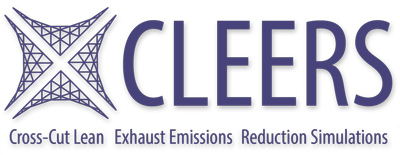Lean-Rich Cycling for Passive SCR Lean Gasoline Emission Control
Jim Parks, ORNL
Passive selective catalytic reduction (SCR) is an emission control approach for reducing NOx emissions from lean gasoline engines. In passive SCR, NH3 is produced over the three-way catalyst (TWC) during rich combustion, and a downstream SCR catalyst stores the NH3 for reduction of NOx emissions during lean combustion where the TWC is not effective at reducing NOx. Periodic rich operation is required to produce sufficient NH3 to reduce the lean NOx emissions and maintain a sufficient level of stored NH3 on the SCR catalyst to provide effective NOx control. However, since rich combustion entails more fuel consumption than lean operation, maximizing the efficiency of NH3 production during rich operation is critical to maximizing system fuel efficiency. In this study, bench flow reactor and engine-based experiments were conducted to study the NH3 production and utilization for NOx emission control during lean-rich cycling. Different TWCs were studied with emphasis on understanding the effects of oxygen and NOx storage components and their effect on NH3 production. The effect of O2 and NOx storage components on lean-rich transitions was also studied. TWC formulation implications on process chemistry and system efficiency will be discussed.

